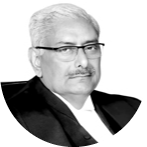Arun Mishra

Arun Mishra
Former Judge of the Supreme Court of India
Assumed Office7th Jul, 2014
Retired On2nd Sep, 2020
Previously
Chief Justice of the Calcutta High Court December 14th 2012-July 6th 2014
Chief Justice of the Rajasthan High CourtNovember 26th 2010 - December 13th 2012
Judge of the Madhya Pradesh High Court October 25th 1999 – September 12th 2010
Chairman of the Bar Council of India 1998-1999
Vice Chairman of the Madhya Pradesh State Bar Council 1998-1999
Profile
Career as an Advocate
Justice Mishra is the son of Justice H.G. Mishra of the Madhya Pradesh High Court. He practised constitutional, civil, industrial, service and criminal law matters. He served as the Vice-Chairman of the Madhya Pradesh State Bar Council and the Bar Council of India.
In 1998, he became the youngest Chairman of the Bar Council of India. During his tenure, the Bar Council decided to shut down evening law colleges and institute the 5-year undergraduate course instead of the 3-year course. Over 200 law colleges were shut down for being sub-standard and a large number of disciplinary cases were decided to maintain the dignity of the profession. The medical aid to lawyers was enhanced. Justice Mishra also drafted and implemented the Foreign Law Degree Recognition Rules, 1997 under the Advocates Act of 1961, the Bar Council of India Employees’ Service Rules, 1996 and rules about foreign lawyers’ practice in India.
Career as a Judge
On October 25th 1999, Justice Mishra was appointed as a Judge of the Madhya Pradesh High Court. During this time, he also served as the Chairman of the Madhya Pradesh State Legal Services Authority. In 2010 Justice Mishra was appointed as the Chief Justice of Rajasthan High Court. On December 14th 2012, he was appointed as the Chief Justice of the Calcutta High Court.
On January 1st 2019, Justice Mishra joined the Collegium. He retired on September 2nd 2020 and was appointed as the chairperson of the Nation Human Rights Commission on June 1st 2021.
Post-Retirement
On June 2nd, 2021, Justice Arun Mishra took charge as the new Chairperson for the National Human Rights Commission (NHRC). In 2019, the Parliament enacted an Amendment to the Protection of Human Rights Act, 1993, allowing former SC Judges, not just former to be considered for the position. Justice Mishra became the first former SC Judge who did not previously serve as the Chief Justice of India to be appointed to the position. Immediately afterwards, 71 activists and members of human rights organisations issued a joint statement comdemning his appointment as NHRC chairperson.
On October 12th, 2021, at an event for the 28th Foundation Day of the NHRC, Justice Mishra caused a stir, stating ‘It is now a norm to accuse India of human rights violation at the behest of international forces’. During the same event he highlighted the problematic tendency of Indian police to file false cases.
Later in December, he once again shone a light on the police in light of Assam’s ‘zero tolerance’ policy against crimes which reportedly led to a number of encounters in the state leading to many injuries and deaths. Justice Mishra spoke against the scourge of ‘fake encounters’, but clarified that he did not believe all the encounters were fake and the NHRC was in the process of examining the veracity of many of the claims.
Notable Judgments
In February, a three-judge Bench comprising Justices Mishra, Banerjee and Sinha ordered the eviction of tribal communities and forest dwellers whose claims over land were rejected under the Scheduled Tribes and Other Traditional Forest Dwellers (Recognition of Forest Rights Act), 2006. The order was considered to affect nearly 1 million families and the court stayed its order after sharp criticism.
In In Re: Matter of Great Public Importance touching upon the Independence of Judiciary, Justice Mishra was a member of the three-judge bench examining claims that the sexual harassment allegations against the Chief Justice of India were fabricated as part of a larger conspiracy to undermine the judiciary’s independence.
In Partap Singh Bajwa v Chairman Rajya Sabha a five-judge bench was constituted to decide if the Rajya Sabha Chairman’s rejection of an Impeachment Motion against the then Chief Justice is subject to judicial review. The petitioners withdrew their petition by objecting to the Chief Justice constituting the bench in a matter that concerned him.
In Common Cause v Union of India, a division bench of Justices Mishra and Roy rejected an NGO’s demand for a criminal investigation into the ‘Sahara-Birla’ Diary for alleged large payments to politicians.
In Campaign for Judicial Accountability and Reforms v Union of India a Constitution Bench ruled that the Chief Justice is the ‘Master of the Roster’ and enjoys absolute power to decide bench strength and composition. This negated Justice Chelameswar’s order directing the formation of a Constitution Bench in the Orissa Medical College scam.
